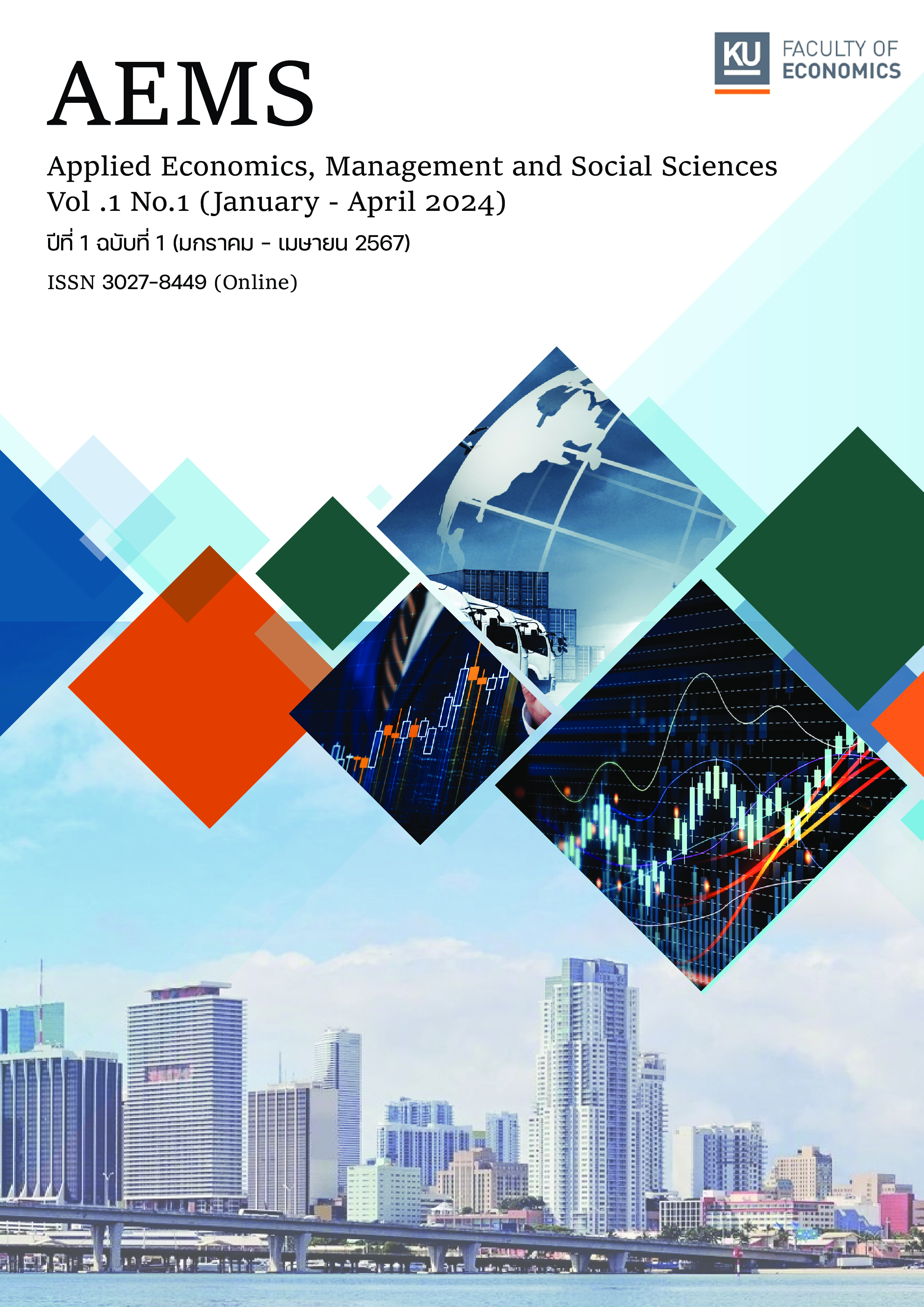Public perception and attitudes of biofuels in Thailand
Main Article Content
Abstract
The objectives of the study are to examine the general public’s perceptions and attitudes of biofuels and to investigate the factors affecting differences in perception and attitudes. A sample of 614 drivers aged 18 and above completed the questionnaire electronically. The results were analyzed using descriptive statistical and cluster analysis. The study found that the majority of the sample group had a relatively high average income, around 51,946 Baht per month, and were in the middle-age group. It also found that the public's perceptions of biofuels are limited, with many having misunderstanding about the price of biofuels and the proportion of biofuels in gasoline. However, they were good awareness in the benefits of biofuels in terms of the economy and the environment. They would be more willing to use biofuels under the biofuel prices subsidies. The cluster analysis results revealed that the economic and social characteristics of the samples did not significantly influence a better perception of biofuels. It suggests that the middle-aged and economically stable population should receive more information and awareness about biofuels.
Article Details
References
กรมพัฒนาพลังงานทดแทนและอนุรักษ์พลังงาน. (2563). แผนพัฒนาพลังงานทดแทนและพลังงานทางเลือก พ.ศ. 2561 – 2580 (AEDP2018). ค้นจาก https://www.policy.asiapacificenergy.org/sites/default/files/Alternative%20Energy%20Development%20Plan%202018-2037%20%28AEDP%202018%29%28TH%29.pdf.
กรมพัฒนาพลังงานทดแทนและอนุรักษ์พลังงาน. (2566). นโยบายและแผนพลังงานหมุนเวียนของประเทศไทย. หลักสูตรวิทยากรพลังงานสำหรับนักบริหารรุ่นใหม่ รุ่น 9 (วพม. 9). ค้นจาก https://www.thailand-energy-academy.org/assets/upload/coursedocument/file/Renewable%20Energy%20Policy.pdf.
ธัญพร ประสารเกตุ และศยามล เอกะกุลานันต์. (2555). ปัจจัยที่มีอิทธิพลต่อการยอมรับการใช้น้ำมันแก๊สโซฮอล์ E85 ของผู้ขับขี่รถยนต์ส่วนบุคคลที่มาใช้บริการที่สถานีบริการน้ำมันแห่งหนึ่ง. วารสารสังคมศาสตร์และมนุษยศาสตร์, 38(2), 223-235.
พิรดา กสินาชีวะ. (2559). การรับรู้ ทัศนคติ และปัจจัยที่มีผลต่อการใช้ไบโอดีเซลเพื่อทดแทนเชื้อเพลิงดีเซลสำหรับรถยนต์. วารสารปัญญาภิวัฒน์, 4, 1-14.
สำนักนโยบายและแผนพลังงาน. (2566). รายงานสถิติพลังงานของประเทศไทย. กระทรวงพลังงาน. ค้นจาก https://www.drive.google.com/file/d/1ogLNT7vAybN3HYkrT3jhfzvMXy6eC-zh/view.
เออวดี เปรมัษเฐียร, จิตรลดา เชาวณาพรรณ์, และสันติ แสงเลิศไสว. (2561). ความเต็มใจจ่ายของผู้ขับขี่เพื่อลดการปล่อยก๊าช CO2 ของน้ำมันแก๊สโซฮอล์. วารสารการจัดการสิ่งแวดล้อม, 14(1), 24-39.
Anderson, D. R., Sweeney, D. J., Williams, T. A., Camm, J. D., Cochran, J. J., Fry, M. J., & Ohlmann, J. W. (2019). Statistics for Business and Economics. (Metric Edition). Boston: Cengage Learning.
Balogh, P., Bai, A., Popp, J., Huzsvai, L., & Jobbágy, P. (2015). Internet-orientated Hungarian car drivers’ knowledge and attitudes towards biofuels. Renewable and Sustainable Energy Reviews, 48, 17-26.
Baral, N. (2018). What socio-demographic characteristics predict knowledge of biofuels. Energy Policy, 122, 369-376.
Chaiyapa, W., Nguyen, K. N., Ahmed, A., Vu, Q. T. H., Bueno, M., Wang, Z., Esteban, M. (2018). Public perception of biofuel usage in Vietnam. Biofuels, 12(1), 21-33.
Delshad, A. B., Raymond, L., Sawicki, V., & Wegener, D. T. (2010). Public attitudes toward political and technological options for biofuels. Energy Policy, 38(7), 3414-3425.
Dragojlovic, N., & Einsiedel, E. (2014). The polarization of public opinion on biofuels in North America: key drivers and future trends. Biofuels, 5(3), 233-247.
Dragojlovic, N., & Einsiedel, E. (2015). What drives public acceptance of second-generation biofuels? Evidence from Canada. Biomass and Bioenergy, 75, 201-212.
Garcia, T. C., Durand-Morat, A., Yang, W., Popp, M., & Schreckhise, W. (2022). Consumers’ willingness to pay for second-generation ethanol in Brazil. Energy Policy, 161, 112729.
Karytsas, S., & Theodoropoulou, H. (2014). Socioeconomic and demographic factors that influence publics' awareness on the different forms of renewable energy sources. Renewable Energy, 71, 480-485.
Li, T., & McCluskey, J. J. (2017). Consumer preferences for second-generation bioethanol. Energy Economics, 61, 1-7.
Løkke, S., Aramendia, E., & Malskær, J. (2021). A review of public opinion on liquid biofuels in the EU: Current knowledge and future challenges. Biomass and Bioenergy, 150, 106094.
Mamadzhanov, A., McCluskey, J. J., & Li, T. (2019). Willingness to pay for a second-generation bioethanol: A case study of Korea. Energy Policy, 127, 464-474.
Moula, M. M. E., Nyári, J., & Bartel, A. (2017). Public acceptance of biofuels in the transport sector in Finland. International Journal of Sustainable Built Environment, 6(2), 434-441.
Mouzaidis, P., Tsatiris, M., Damalas, C., Tsantopoulos, G., Katsileros, A., & Milis, C. (2022). Investigation of the attitudes of Greek consumers towards the biofuel’s consumption using social acceptance theory. Biofuels, 14(1), 109-118.
Paravantis, J. A. (2022). 38 - Socioeconomic aspects of third-generation biofuels. In E. Jacob-Lopes, L. Q. Zepka, I. A. Severo, & M. M. Maroneze (Eds.). Generation Biofuels (3rd). (pp. 869-917). Cambridge: Woodhead Publishing.
Radics, R. I., Dasmohapatra, S., & Kelley, S. S. (2016). Public perception of bioenergy in North Carolina and Tennessee. Energy, Sustainability and Society, 6, 1-11.
Tan, P. N., Steinbach, M., Kumar, V., & Karpatne, A. (2019). Introduction to Data Mining eBook. (Global Edition). New Jersey: Pearson Education.
Van de Velde, L., Verbeke, W., Popp, M., Buysse, J., & Van Huylenbroeck, G. (2009). Perceived importance of fuel characteristics and its match with consumer beliefs about biofuels in Belgium. Energy Policy, 37(8), 3183-3193.
Wegener, D. T., Kelly, J. R., Wallace, L. E., & Sawicki, V. (2014). Public opinions of biofuels: attitude strength and willingness to use biofuels. Biofuels, 5(3), 249-259.

